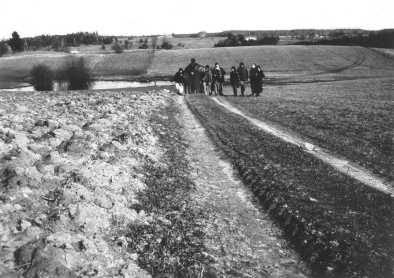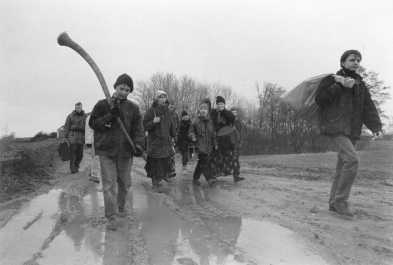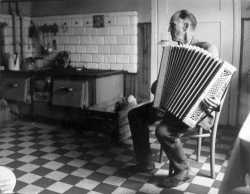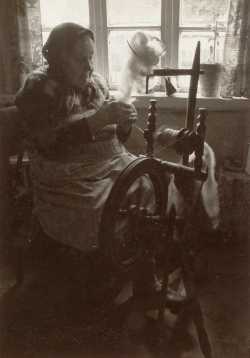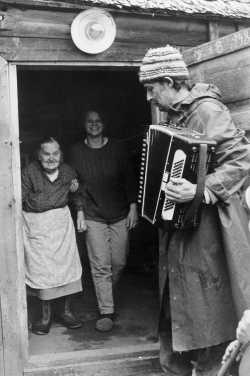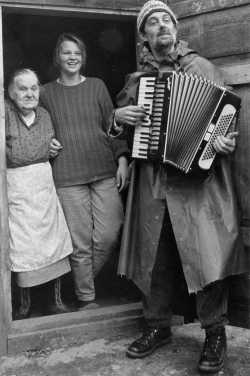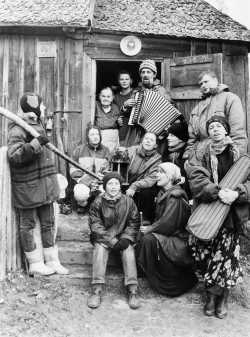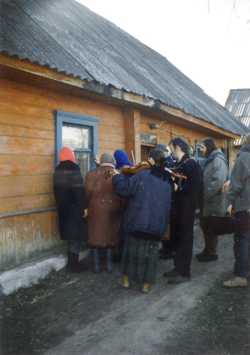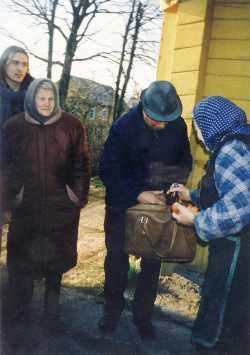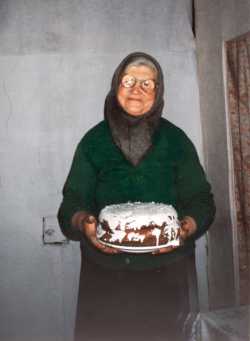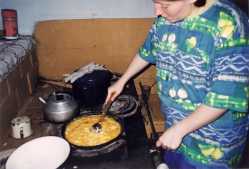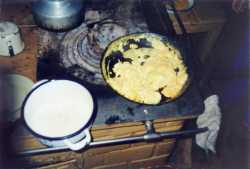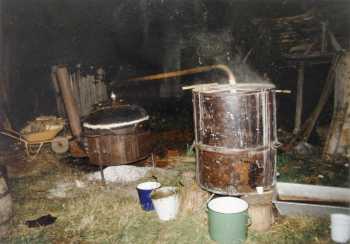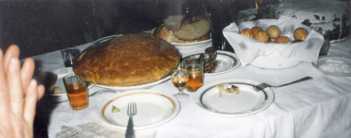11-042 jonkowo
węgajty 18
phone/fax: (0048-89) 5129297
art director: wacław sobaszek
 e-mail: wioskateatralna@gmail.com
how to get there
guest book
blog
links
e-mail: wioskateatralna@gmail.com
how to get there
guest book
blog
links
 e-mail: wioskateatralna@gmail.com
how to get there
guest book
blog
links
e-mail: wioskateatralna@gmail.com
how to get there
guest book
blog
links
alelujki
-
In the darkness or during the day, from house to house there leads the path of kindness. People know that we are coming. They are waiting. From the fields, music and song come - a clear sign 'a-coming'. Singing, we reach the first household. The door opens, yet no one stands in the doorway. Astounded, we wait. A moment of silence - finally, we enter the house. Only inside, not on the threshold and not in the doorway, the hosts greet us, often old and lonely 'the children, sir, they are all gone to the city and left us...' They sing with us, start new songs, tell us about their joys and sorrows. They laugh, they cry. They offer us all the food they've got. They toast everyone in turn with their moonshine vodka. They stop us when we want to leave. Yet, we have to go, to the others who are waiting. And thus, out of the
warmth, out of the whirlpool of the dance, with the hosts' good word, with 'dyngusik', with some words of reassurance that we shall indeed come again next year - we wander off to another house. We visit many people. Quite often, all of a sudden, a neighbour turns up at his neighbour place, wanting to lead us to his house, as 'you can go astray in the dark, and it wouldn't be right at all if you missed us...' Thus we follow our next host, to meet the family and add some colour to their holiday.
Agata Rychlik
Wędrowanie z Węgajtami, after: Scena nr XI, 1998
Wędrowanie z Węgajtami, after: Scena nr XI, 1998
-
Węgajty's wandering has its inner form and rhythm. Music resounds practically all the time. Its character depends on the surrounding landscape or the dominant mood. On the lakeshore, the longing sound of the shepherd's horn reverberates. Later, on the top of a hill, the same horn sounds triumphant; then there's a moment of dance on a beautiful meadow, then the joyful song - signal: 'a-coming!' When you march, the music is lively; when you rest, it gets more gentle. After some time music becomes an organic whole with carefree journeying. Just as unusual as the music is what the group looks like against the beautiful Suvalkiya landscape. A giant drum, still bigger double-bass, violin, accordion, clarinet and the two-metres-long shepherd's horn, surprising in such an ensemble - such is the picturesque instrumentarium of the
ensemble. After and around the procession, a trail of happy children always joins the wandering musicians. All to the effect of a very free and spontaneous, apparently unreal, ever changing composition.
The ritual of 'going with alleluia' has a certain traditional, musical and theatrical structure. The band starts the song and while it lasts, the hosts walk out before the house, inviting the comers inside.
Tadeusz Kornaś
Wanderers from Land of Rachmans, after: Teatr nr 2, 1991
Wanderers from Land of Rachmans, after: Teatr nr 2, 1991
dziadówek
Sunday
The window out of which he is looking most of the day is situated exactly opposite mine, across the street. Sometimes I meet him as I pass through the adjacent yards; he is sitting on the fence drinking beer. When the Sun sets, he comes back home, eats something. Then he goes out again to smoke a cigarette. In the morning, he stands in the door, looks around, takes a bottle of vodka from under his jacket and gets a swig. Sometimes his son comes to visit, they have a beer together. The son goes, he sits in the window again. When I look at him so, I can see only his head silhouetted against the blackness of the background. The curtains are drawn aside. Never can I see light inside. Unknown space, mysterious space? Or perhaps a dying space? What is hiding there? If one could just peep in with a candle...The Sun is setting. Our journey on the Easter Sunday is drawing to a close. We are in Dziadówek, a village where houses are few and the space - infinite. A village like every other, only that you won't find many other like this one anymore... We are lost in contemplation of the landscape. Households are each put aside between hill and hill, the fields' boundaries drawn with lines of stones.
- And who'd that be? - asks one of us
- This is Antoni Jankowski - replies Wacek. - Good day, Mister Antoni.
I lean to look through the window. By the road, a man sits on the ground. He is soused; he tries to stand up. You can't really understand what he's saying or be understood, yet he recognises us. A drunken man is heavy like so much rock.
We've reached our destination. The car goes uphill, where Granny Maliszewska lives. A little wooden cottage looks out a spruce wood. The holes in the roof have grown bigger. Behind, the vast stretches of pinkish - orange sky. The colours seem uncanny to us, really unique. Once, this hill was submerged in the yellows of linen, on the meadow, sheep were grazing.
- I used to do weaving, one would grow linen. I would weave wool as well. Those were the times when you still did those things at home. The times were better, more beautiful. By the house, her husband's smithy used to stand. On the frying pan which he made there, we scrambled eggs, the ones we got walking with alleluia.
Granny was ill in the winter. But now she looks beautiful. She is eighty-nine. Easter Monday is the anniversary of her wedding.
- I thought I would not live until the Spring, that I would not see you again, and here you are.
We sing her some Easter songs and set off. We have to go round Dziadówek today. Tomorrow - Dzierwany and Kłajpedka.
The Sun has set. The day's heat turns into cold. The stones warmed up during the day now are cooling off. We wander through the night. Entering each house is like opening the door to a stove. The hosts give us a warm welcome, not to mention the usual glass of vodka. From the pantry they bring home made sausage, freshly baked bread, cakes, salads. All through the meetings we sing Easter songs, konopielkas, we dance, remember and talk. Everywhere we experience reception through expectation. Our visit is fulfilment, is necessity. If they were lacking, a big hole would appear in the ground and swallow all the world up.
Yet, we cannot stay too long in any of the houses.
Thank you for your goodly presents,
That you gave us for no paying,
That you gave without regretting,
May you gain heavenly getting.
And it is by no means easy to leave such a warm house. At Krystyna's and Henryk's, in a cardboard box on the stove, they keep some newly hatched chickens. Their twitter resounds in the kitchen. The host sits by the chickens, smiling. His wife keeps bringing new culinary goodies. She tells us that this year they are planning to renovate their cottage. They are going to tear down the old kitchen and put in central heating. I look around the room. Nothing has changed since last year. The image of Christ praying on the Mount of Olive is hanging exactly where it was last year. An old, pedal sewing machine, just as last year, looks as if somebody has just stopped sewing. And the sausage is just as good as it was a year ago... or perhaps even better. Mr Henryk is an excellent dancer. Whirling in song and dance we come to the Grupkajtis house. We sing some Easter songs in front of the house for the hosts to hear us. An elderly gentleman opens the door. He sends us an invisible smile from beneath his black moustache. An elderly lady greets us sitting stately in the kitchen, opposite the door.
Vodka is the devil's water. I don't know if it be through vodka or through some uncanny sort of 'opening', that I experienced looking outside from inside. Looking with the eyes of our host. It's really an incredible feeling, to sit on the stove like that and feel, through walking with alleluia, that you have come to visit yourself. It is like crossing a barrier of some sort. Time barrier? The barrier between being the host or the alleluia person. It is like being an insider. Today,I'm visiting you, tomorrow I receive you. There is no division. The inside becomes one with the outside. This must be the essence of real meeting. Parallel and exchange. The balance is kept. This must be the mystery of the alleluia and the carolling.
In the glass, there was a hole,
And how this hole did come about?
There came a hen, she pecked and pecked,
And let all vodka out.
Ms Grabkowa and we sing a song of a woman who killed her children and how she wanted to reach hell. By the Grabek's nothing has changed, either, only it seems there are more people in the house this year. Some of them sit in the room next to the kitchen. They look at our alleluia from the dark, unlit inside of the room. They look a little like ghosts, they say nothing.
This is how we go through Dziadówek. The lantern is lighting us the way. And rightly so, as there are puddles here and there, you can also trip over a stone. The road is beautiful, it is like a ravine on the hill. By the lake, which looks as if it appeared only at nights, we turn to visit Antoni. On the road leading to the house, by a heap of stones, someone shouts out: lumiere!
The threshold is high. Antoni greets us in his warm house, all wooden, made out of the essence of wood. Everything is dark brown, even Antoni himself is like old wood. There's a whiff of smoke (or maybe sulphur) in the air. In this space, faces come alive. They appear in the light like masks. Here also I realise having the feeling of a junction of the inside and the outside. Only it is from another side (probably after a vodka with coke at the Grabeks'). This alleluia goes out its 'frames'. The host is scorned by the whole village. He has drunk away all the farm. He lives with his son, who's a drunkard just like he. Yet, in his house some extraordinary things happen. I can't take my eyes off the scene. Apart from the basic kitchen furniture, there's nothing else lying in view. On the cold stove, two pots with water stand. That's all. It is among other things the asceticism of the place which is causing the magic. Light pours out and about freely. Some people are embarrassed. How to avoid being offered vodka again? Wacek talks to Antoni. Now I feel as if in theatre. For what reason? I guess the reason is the clarity, the purity. Voice reverberates in the space, doesn't disappear among trinkets. The clarity of gesture, movement, words in the context of something very important. Alleluia is a feast. What is really important? Everything is important.
Looking at this meeting is looking through a candle flame. It's like falling in love with the world.
Another scene in Antoni's house is the event in the room where up to last year dances and Wegajty performances in Dziadowek had been taking place. Now our entering this place is very intimate.
Music becomes touch.
Dancing in this space I know, that every step is very important. I ask Antoni to dance. He dances with pleasure, but first he has to down a glass. I can feel uneven floor under my feet.
Monday
After the visit at the Roszkowski family, massively presented with beautifully ornamented Easter eggs, we came back to Granny's house for the night. Morning came quickly, soon the Sun had warmed the air.In the local "church" some Aleeluia people have met. For the first time in my life I had been in a church located in a former shop. On the window sills - plastic flowers; in the windows - curtains, and people inside. And next to the church - an old Evangelic cemetery fenced off by a row of stones. Clarity.The day is clear like a rock crystal. The air - like in Swiss Alps. And we, in side of this crystal, rolling with the Aleeluia. Night stones gain glamour of their own. Everything around us has intensive colours, voice coming from the feet or maybe from beneath the ground. On Sunday afternoon, we find the people sat at their feasting tables. They receive us in their houses and often in the yards. Then the music resounds in all neighbourhood and there is more space for dancing. The neighbouring houses, hearing the aleeluia people, prepare the vodka and eggs. At Prusaczka, the table is beautifully clad with an ornate tablecloth. On the table, delicacies to welcome the guests. The hostess toasts each musician in turns. At Gienek Bacewicz, cranberry juice by way of a chaser and on the host's hand - his little son, Karol. Gienek is receiving us together with his neighbour, Jan Bujanowski. In Gienek's yard, there is a ladder, standing. It is very long and painted blue. Its upper end meets the sky and blends with its blue. Gienek talks about love and hugs girls. His wife is bustling about, busy bringing us more and more food.
This walking with aleeluia by day, through house and yard, full of sunshine, music in the sunshine, good wishes and blessings, however varied, is in a way all the same, every event very similar to each other. It is a continuation of the Easter breakfast. The dance we did on the grass in front of the theatre was the beginning of this journey.
Mutual closeness within the group but also closeness between heart and heart. From stone to stone. The closeness between the foot and the ground. The closeness towards where you are, what you are for. Inner closeness. Closeness inward.
Crystal as the inner or the outer layer of a stone.
What would Dziadowek look like, if on the fields there were,
Instead of grey stones, giant crystals?
Or if you looked inside a stone with your lantern?
P.S.
And the event? In the big barn at Roszkowskis', with its elegant patchwork on the wall, like a duvet from a big bed, which had dreamt a lot. First, a giant dragon, three-headed, rears up his head, to be then smothered by Saint George. Joy in rebirth is also joy in the waking up.The wedding story is a little like a story from a dream divination. First, the conductor sets the tone, with his music leading us into a dream: it is going to be something far beyond your dreams... you can't predict it, but maybe it helps if I tell your fortune. What shall the card say? Brother-in-law sells the bride. Although the bride proved trustworthy, the character of the brother-in-law calls for spectators' suspicion. This is how this scene, like straight from a village wedding, came about. A stocky, soused local in a turqoise turtleneck and leather jacket approached the slender brother-in-law and clutching him in the crotch lifted him up. Alas, the brother-in-law did not whack him on his gob but in a worthy manner got outraged and took back the bride, who on her part quite liked the local's attitude as she, throwing back a last flirtatious goodbye glance, threw out her buttock's
Magda Bartnik Dziadówek 2004
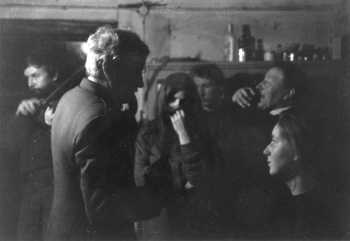
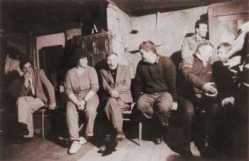 |
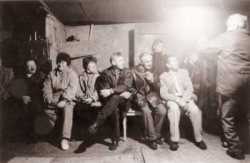 |
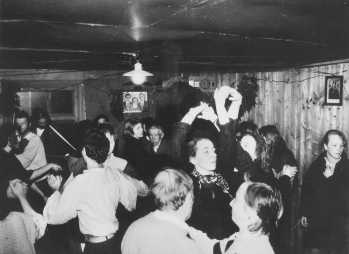
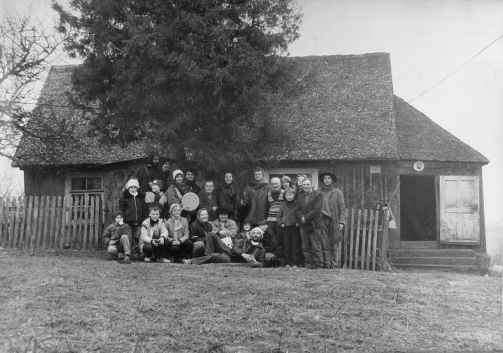

up
design: © Grzegorz Kumorowicz 



